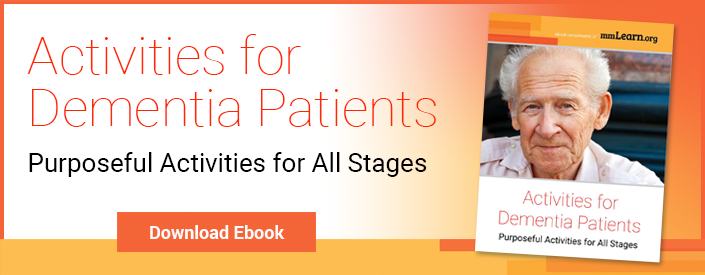 You never really know how it will go when visiting a family member with dementia.
You never really know how it will go when visiting a family member with dementia.
They might recognize you and reach out in love and appreciation that you came to see them. Or they might withdraw or lash out in frustration, seemingly angry at the world for being so confusing.
And you love them all the same.
The nature of the disease is that people’s cognitive abilities, moods, and behavior can shift day by day, hour by hour.
But visits are important for caregivers and family members—and especially for people with dementia.
For a start, visitors and caregivers can get familiar with some of the medical, emotional, and cognitive aspects of dementia.
Understanding Dementia
Dementia is the broad term for a decline in memory and cognitive function. Alzheimer’s disease is the most common form of dementia, but there are many other forms with some differences in how they affect the brain.
In this mmlearn video, Dr. Jason Schillerstrom discusses the various forms of dementia, explaining the differences between the three most common types: Alzheimer’s disease, vascular dementia, and Lewy body dementia.
All of these types of dementia include some form of memory impairment that affects short- and long-term memory, verbal memory, and motor skills. Many also experience
- Aphasia—when they can’t find the right words
- Apraxia—when they have trouble with motor skills
- Agnosia—when they have trouble identifying objects
- Executive function impairment—when they have trouble controlling and organizing their behavior
- Functional impairment—when they can’t groom or take care of themselves without help
It’s a lot to adjust to, for family members and patients.
It’s perfectly natural to feel a bit apprehensive about visiting a loved one with dementia, but the following tips can help your visit go more smoothly. Or…help you move past it if you have a rough visit.
11 Tips for Better Visits with a Person with Dementia
- Prepare for the unexpected. Sometimes a loved one’s condition might have changed rapidly since you last saw them. It’s important to prepare mentally and emotionally for this possibility. Dementia doesn’t have a linear progression, so there will be ups and downs. A patient’s condition can even vary during different times of the day. For example, sundowning is when a person becomes more confused or agitated at nightfall. It happens a lot to people with dementia. So maybe check with the staff ahead of time to ask when your loved one is at their best for a visit.
- Keep your visit brief. If you limit your visit to an hour or less, you and your loved one might be more likely to enjoy your time together. Visiting can be tiring, and it’s better to keep it short and sweet.
- Minimize distractions. Silence your phone and turn off the TV or radio so you can spend some quality time in peace with your loved one.
- Introduce yourself. Even if your loved one has always recognized you before, introducing yourself helps avoid the stress and embarrassment when they don’t. And it does happen. Just say something like, “I’m your nephew, Paul—your sister Sharon’s son.” If they don’t seem to know who you are, it is still okay to visit and spend time together.
- Respect the patient. Even though it feels like the person may have regressed to a childlike state, it’s important not to treat them like a child. It’s often not clear how much people with dementia are comprehending. Talking down to them can be hurtful or confusing, even if they have trouble expressing it.
- Agree. People with dementia often have a different understanding of reality, and it is not helpful to disagree with them or correct them. For example, sometimes they will believe another relative is still alive after they have passed. Experienced staff who work with dementia patients point out that there is usually no purpose in correcting the person on their confusion. It requires a shift in our learned behavior, but it is okay to go along with a fiction. If it doesn’t affect the patient’s health or care, it’s probably not important enough to correct them on.
- Be reassuring and calm. Losing cognitive function is frightening. Sometimes patients experience a range of emotions. They can become angry, agitated, or sad. When visiting, you can find ways to reassure them that you understand their emotion and that you are there for them.
- Reach out and touch. Human touch is healing. Holding someone’s hand, looking into their eyes, or rubbing their feet is a way to connect without words. Some experts recommend asking if you can touch someone before starting a conversation. It can be grounding.
- Share music. Singing, playing an instrument, or listening to music together is a great way to connect with someone with dementia. Studies have shown that music stimulates the brain and improves memory. Songs and lyrics are housed in a different part of the brain, so sometimes a person with dementia who has a hard time communicating verbally can still sing along to a favorite song from their past. Give it a try. Even if they can’t sing along, it is still great for a patient to hear some music they love.
- Be kind. Practice patience and compassion for the patient, and importantly, be kind to yourself. Those who have lived or cared for people with dementia know it can be challenging. Sometimes we lose our patience. We need to try to do better, but we also need to forgive ourselves when we make a mistake.
- Consider dementia activities. There are helpful ways to pass the time and help your loved one engage their brain. In mmlearn’s free ebook, Activities for Dementia Patients, Maria Wellisch, a nurse and licensed nursing facility administrator, shares a number of activities that she has found helpful in her professional life and while caring for her own mother.
Living with Dementia
Dementia is already affecting millions of people around the world. Humans live longer, but living longer means an increased prevalence of dementia in our aging population.
According to Dr. Thomas Weiss, the number of people with the most prominent type of dementia—Alzheimer’s disease—could reach as many as 14 to 15 million by 2035, up from 5.5 million in 2010.
While researchers strive to control and eventually prevent the disease, dementia will be a reality in our lives for years to come. If trends continue, it is likely to affect more of our friends and family members.
As we wait to cure this difficult disease, let’s take care to have meaningful visits with our loved ones.

